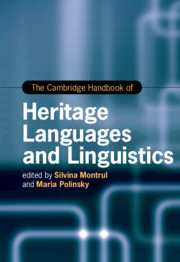Book contents
- The Cambridge Handbook of Heritage Languages and Linguistics
- Cambridge Handbooks In Language And Linguistics
- The Cambridge Handbook of Heritage Languages and Linguistics
- Copyright page
- Dedication
- Contents
- Figures and Tables
- Contributors
- Acknowledgments
- Introduction
- Part I Heritage Languages around the World
- Part II Research Approaches to Heritage Languages
- Part III Grammatical Aspects of Heritage Languages
- Part IV Heritage Language Education
- Index
- References
Introduction
Heritage Languages, Heritage Speakers, Heritage Linguistics
Published online by Cambridge University Press: 04 November 2021
- The Cambridge Handbook of Heritage Languages and Linguistics
- Cambridge Handbooks In Language And Linguistics
- The Cambridge Handbook of Heritage Languages and Linguistics
- Copyright page
- Dedication
- Contents
- Figures and Tables
- Contributors
- Acknowledgments
- Introduction
- Part I Heritage Languages around the World
- Part II Research Approaches to Heritage Languages
- Part III Grammatical Aspects of Heritage Languages
- Part IV Heritage Language Education
- Index
- References
Summary
Heritage languages are minority languages learned in a bilingual or multilingual environment.1 They include languages in diaspora spoken by immigrants and their children, aboriginal or indigenous languages whose role has been diminished by colonizing languages, and historical minority languages that coexist with other standard languages in diverse territories. All these examples indicate that in any given context a heritage language instantiates one of the languages in a bilingual society; thus, heritage languages fall under the rubric of bilingualism. Bilingualism is not a new phenomenon, socially, demographically, or linguistically, but attention to heritage languages has been relatively new in bilingualism research, with first mentions of heritage speakers in English research studies dating back to the 1990s (Cummins 1991).
- Type
- Chapter
- Information
- Publisher: Cambridge University PressPrint publication year: 2021
References
- 1
- Cited by

